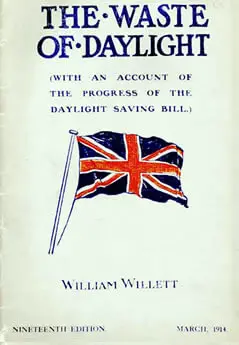‘Spring forward, fall back’ is a mnemonic relating to Daylight Saving Time, indicating that clocks are moved forward an hour in spring and back an hour in autumn.
Spring forward, fall back
What's the meaning of the phrase 'Spring forward, fall back'?
What's the origin of the phrase 'Spring forward, fall back'?
Autumn is the time of year for English wrinklies like me to bemoan the creeping Americanization of our culture, as we see Bonfire Night being steadily superseded by Halloween. The ‘penny for the guy‘ of our youth has gone and been replaced by trick or treat and green-faced ghouls at our doors demanding sweets. While finishing off the left-over sweets and transporting myself back to Olde England when reading Wolf Hall, Hilary Mantel’s excellent novel set in Tudor England, I groaned again at her use of the American ‘fall’ to mean autumn.
However… it’s always advisable to have a stack of reference books nearby when reading the esteemed Hilary’s work and I checked the OED tucked inside my iPad. I need not have grumbled; ‘fall’ is indeed a genuine Tudor word, deriving from the phrase ‘fall of the leaf’.
The expression is first found in print in Toxophilus, 1545, an archery instruction manual by Queen Elizabeth’s tutor Roger Ascham, in which he lists the seasons as:
Spring tyme, Somer, faule of the leafe, and winter.
This became shortened to ‘fall’ a century or so later, as in this example in the first known text on forestry, John Evelyn’s Sylva, 1664:
His [the Oak] leaves becoming yellow at the fall, do commonly clothe it all the winter.
‘Fall’ travelled to North America with the early settlers and established itself there as the common name for autumn. The word died out in the UK but has begun to re-colonize now due the the take-up of the US expression ‘spring forward, fall back’ which we all use toward the end of October when, using the old English parlance, ‘the clocks go back’.
Daylight Saving Time, or Summer Time as it is called in the UK, is a European innovation. Some claims are made for it being an idea that Benjamin Franklin had while staying in Paris. That’s not quite correct. Franklin did wake one morning at six o’clock to be surprised to see his room in full sun. He scorned idleness and, in the guise of Poor Richard, was the first to publish the proverb ‘early to bed and early to rise makes a man healthy wealthy and wise‘.
Franklin’s industrious mind set to work and calculated that Parisians, by being active in the evening when it was dark and in bed in the morning when it was light, spent 96,075,000 livres tournois [the French currency of the day] more than they need to on candle wax. His suggestion wasn’t to change the clocks; he proposed reducing the use of candles. The French in general and Parisians in particular aren’t famous for embracing change suggested by foreigners and Franklin’s improving ideas weren’t taken up.
The idea of changing the clocks to provide longer evening sunshine was put forward by the New Zealander George Hudson in 1895 but his notion was never implemented either. The first person to carry the idea through to fruition was the London builder William Willett. He wrote the pamphlet, Waste of Daylight in 1907. Daylight Saving Time was, and has remained, a controversial contrivance but Willet’s proposal was taken up in England in the First World War and is now used in many countries, especially those in the Northern Hemisphere.
England sent the word ‘fall’ and the idea of Daylight Saving Time to the US and they sent back the phrase ‘spring forward, fall back’. The first example of it that I can find in print is in an article by Walter Winchell in an October 1957 edition of the Pennsylvania newspaper The Derrick, who credits the coining to a rival newspaper:
New Yorkers and other easterners who enjoy Daylight Savings Time until October’s end are recommended to the Los Angeles Examiner’s clever and simple four-word memo to put the clock ahead or back… “Spring forward, Fall back.”
The history of “Spring forward” in printed materials
Trend of spring forward in printed material over time
Related phrases and meanings
Browse more Phrases
About the Author

Phrases & Meanings
A-Z
A B C D E F G H I J K L M N O P Q R S T UV W XYZ
Categories
American Animals Australian Bible Body Colour Conflict Death Devil Dogs Emotions Euphemism Family Fashion Food French Horses ‘Jack’ Luck Money Military Music Names Nature Nautical Numbers Politics Religion Shakespeare Stupidity Entertainment Weather Women Work
How did we do?
Have you spotted something that needs updated on this page? We review all feedback we receive to ensure that we provide the most accurate and up to date information on phrases.
